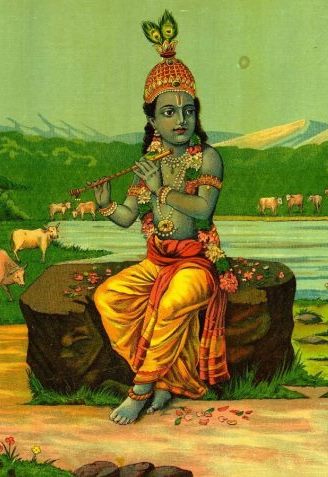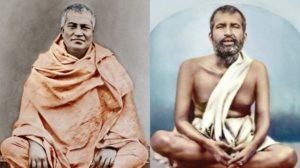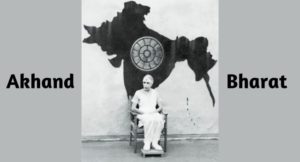Connect your consciousness with the Infinite Consciousness of God-realized sages. Subscribe to daily quote broadcast via WHATSAPP OR INSTAGRAM OR TELEGRAM
The below story was published under the editorial supervision of Swami Vivekananda, in the second ever issue of the Prabuddha Bharata Magazine, released in August 1896. The name Prabuddha Bharata means “Awakened India” and this magazine started by Swami Vivekananda continues to be published to this day. You can read its issues online here.
A certain king went into a forest and there finding a sage fell at his feet and asked him the way to salvation. “Absolute renunciation, Sarva sanga parityagam”, replied the sage. The king asked no further questions but thanked him and departed.
And as soon as he reached his kingdom he abdicated his throne, took the vow of sannyas, retired into the forest, built there an Ashram and began to lead a lonely life. A few years passed on in this way but he had not become any wiser.

– Sri Aurobindo
So he again went to the guru and asked him the way to salvation. Again the guru replied, Sarva sanga parityagam. The king thanked him and departed thinking: “True I have left wife, children, kingdom, wealth and power but I keep here an Ashram and live like a householder.
So he set fire to the hut and began to live in the open air. His body soon lost all vestige of royalty, became pale and emaciated; the sun and rain told heavily on his health; till at last he became a skeleton and unable to even move about. But the bliss of wisdom had not yet come to him. So he again went to his guru and asked of him the way to salvation and again the guru said: Sarva sanga parityagam.
The poor king got miserably confounded. He long thought what else he had to give up. He said, ‘I have no money, no house, no vessels, not even a piece of cloth to wear.’ It struck him that he should now give up the only thing he had and that was his body. Some stories came to his mind of God having presented Himself to his devotees at the critical moment of giving up their bodies.
At once, he rose up and prepared to hurl himself down from a rock. A few minutes more and all would have been over. Just then, his guru presented himself before him and asked him what he was about. The king replied ‘I am only carrying out your behest and am sure as soon as this body also is given up, I shall be saved.’
‘Good God’! exclaimed the sage ‘What a curious meaning you have put upon my words. If this body goes, another immediately comes and where then, is your salvation? I admire your perseverance, but alas! how misdirected! True renunciation is not the giving up of your body, but being free from attachment of any kind in your mind.
You have touch with external things, only through your mind and losing that mental attachment is the only true renunciation. You heard a great truth from me, but had not the patience to ask me what exactly it meant; you may live in the world but not be of it – this is the great secret of renunciation.”
Renunciation is often misunderstood. Though few people carry the error to such an extreme as in the story, many mistake it to be external; and how many homes have been rendered desolate by the mistake! Physical renunciation is really easier than mental and is therefore more common.
Summary
So as the above story illustrates true renunciation is not in running away from work, duty or family responsibilities and living the life of a reclusive monk, but it is in bringing the mind under control and detaching it from worldly passions and desires. Because a person may leave their home and family to be a monk, but if they still remain attached to lust, to greed or to money, then the taking of an outer Sannyas is of no value.
Therefore it is better to cultivate detachment of mind first, and this can be done 1) via the offering of selfless seva to others, as well as 2) by living amidst family. It is in living the life of the common man that countless materialistic attractions arise, giving us the chance to practice cultivating non-attachment (vairagya). Then once a person has gained sufficient control of their mind, he/she can evaluate whether taking Sannyas is the right choice. As Sri Aurobindo has stated:
“We must do our deeds in this world and not avoid doing them. There is no need to flee to the mountains in order to find God. He is here, in you and around you; He is in these men and women whom you see daily, with whom you talk & pass your life.
In no case flee to solitude and inaction as a coward and weakling, — not in the hope of finding God, but because you think you can by this means escape from the miseries and misfortunes of your life which you are too weak to face. It is not the weak and the coward who can climb up to God, but the strong and brave alone.”
– Sri Aurobindo
![]() One Does Not Need to Take Sannyas (Monkhood) to Attain God-Realization – Householders performing Nishkama Karma (selfless actions) at home, can attain to Moksha just as Sannyasins meditating in Himalayas.
One Does Not Need to Take Sannyas (Monkhood) to Attain God-Realization – Householders performing Nishkama Karma (selfless actions) at home, can attain to Moksha just as Sannyasins meditating in Himalayas.








